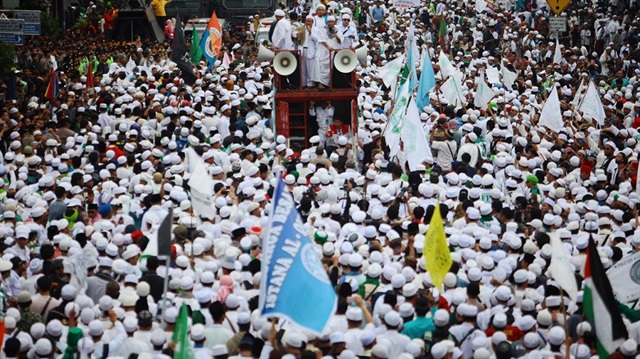
Last November and December, Muslim rallies in Jakarta stated one thing clearly: religion is still an issue, to use a secular expression, and rulers and society have to deal with it. They stressed another thing as well: politics likes to play "unsafely" with faith, trying to take advantage of the people's needs concerning the transcendent world. Jakarta Police Chief Mochamad Iriwan had no doubts that there was a conspiracy to commit "treason" against the state and the government. Basically, the charge against the eight people who were arrested the night before the December rally accused of planning an occupation of Indonesian parliament to force a deliberation to topple the government of President Joko Widodo (Jokowi). As we wrote previously after the November rally that we witnessed, it was clear from the beginning that there was some kind of political manipulation behind the protest, or at least an attempt. This does not mean that the protester's feelings were not real. There is a global stream that pushes people to rely more on God than in bad rulers and politicians. There is global disappointment about corruption and spreading social inequalities, and Indonesia is a twofold instance, according to which side you choose to see. There was a big economic jump thanks to a good interpretation of globalization that allowed the establishment of a wealthy middle class. However, this economic boost happened mostly in the metropolitan area of Jakarta, where there is a good standard of life even in the districts on the outskirts, as well as in a few other cities. Sumatra, for instance, is an underdeveloped area, and it was hit by a devastating tsunami in 2004. Rural areas are generally poor. A World Bank report shows that roughly 1 percent of the population in Indonesia holds 50 percent of the country's economic assets. It is useful to remember that Indonesia is the world's 16th largest economy, bigger than that of the Netherlands and Saudi Arabia and falling only four positions bellow Russia. Another key point is economic assets. Nahdlatul Ulama Secretary-General Yahya Cholil Staquf stressed the heterogeneity of society as another key point of this Garuda two-face. There are several social layers, from Westernized and secular to local grounded in Islamic orthodoxy, and there is no communication between them. If a Gulf-style Wahabi attitude of Islam started to lead public debates, such as what has begun on social networks, there is risk of civil clashes. Yannis Wahid, the daughter of a former president and director of a Wahid foundation once said,"Now the debate is in black and white. If you love the Quran you have to be against Ahok [Jakarta Governor Basuki Tjahaja Purnam].". She quoted Jakarta's governor, one of Jokowi's men, who Muslim protestors recently targeted due to some careless comments on the Quran. One would think these Shallow comments and political ingenuity would not have been used against him before the upcoming February election. The governorship of the capital is strategic and ignites huge political appetites. Jokowi has lost his main international mentor now that U.S. President Barack Obama has left office, and the honeymoon with his national supporter, former Indonesian President Megawati Soekarnoputri, has already ended. Furthermore, Indonesia is in the middle of a would-be conflict between the U.S. and China, as the ongoing South China Sea crisis testifies.
Let's look at some of the results from the police investigation. Among those arrested are Rachmawati Soekarnoputri (Megawati's sister); the former Army Strategic Reserve (Kostrad) commander General Kivian Zen; an activist professor at Indonesia University and Eko Suryo Santjojo, the president of the Gerindra Party think tank. All of them maintain their innocence. Perhaps there has been an over-interpretation of the, according to the pro-civil rights Tempo magazine, which is usually close to Jokowi's vision of Indonesian society. Now, several political observers agree about the weakness of Pancasila's five pillars in the country's constitution: the absoluteness of God, unity (in diversity), democracy, humanism and social justice. For Rachmawati, "Pancasila is dead. We need to come back to the 1945 constitution to save Pancasila's philosophy and prosecute Ahok to defend religion." He will need the best political skill to manage such a sensitive situation and avoid defending fading the pillars with force instead of national dialogue. This is a great challenge for Jokowi and for Indonesia.














